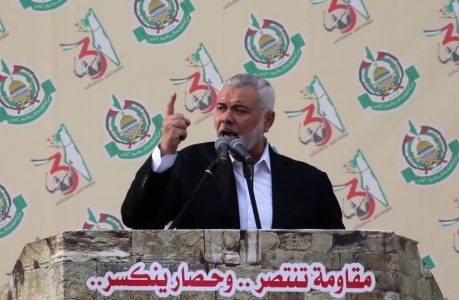
Hamas’s and Palestinian Islamic Jihad’s positions on war and peace are closely coordinated
A report by an intelligence center analyzing an interview by Hamas leader Ismail Haniyeh implied that Hamas’s and Palestinian Islamic Jihad’s (PIJ) positions on war and peace are closely coordinated.
The report by the Meir Amit Intelligence and Terrorism Information Center reviewed a March 3 interview by Haniyeh on Al Mayadeen, a Hezbollah-affiliated television channel in Lebanon.
Haniyeh discussed Hamas’s military buildup, its position on PIJ attacks and its views on a range of ceasefire options, including a long-term one that would require Hamas to disarm, the report said.
Haniyeh’s main message was that Hamas is prepared for a limited arrangement to help ease the humanitarian hardships of the Gazans, but it rejects a long-term ceasefire that could force it to abandon its fundamental positions, such as continuing its buildup of military force and keeping its weapons, the report said.
Haniyeh indicated that “Hamas seeks understandings that will lift the ‘siege’ of the Gaza Strip and provide humanitarian assistance for the Gazan civilian population. He claimed it was acceptable to the other Palestinian organizations,” the report said.
“As soon as the [Israel] occupation commits itself [to implementing the understandings], all the resistance factions [including PIJ] will commit themselves to it. If Israel continues implementing the understandings and fulfills its obligations according to them, in my opinion our side will also continue with the understandings… Our objective is to achieve the aspirations and highest interests of our people as a step [forward] in the plan for the liberation,” Haniyeh said, according to the report.
The idea that Haniyeh is ready to publicly commit PIJ to respecting such a ceasefire is key, as Israeli intelligence has viewed PIJ as generally ready to go rogue and fight with Israel even against Hamas’s wishes.
At the same time, “Hamas has no interest in a long-term lull agreement that will force it to abandon its fundamental positions or disarm,” Haniyeh said, according to the report.
Haniyeh’s position in the interview was: “I don’t think its possible, [because when we talk about a] long-term [lull], we’re talking about years. That demands a broader approach than the issue of the ongoing situation in the Gaza Strip,” the report said.
Haniyeh’s statements about the nature of the arrangement were consistent with those made previously by senior Hamas figures, who said Hamas is prepared to accept a short-term, minimalist arrangement, in which Hamas gets a limited easing of the ‘siege’ in exchange for a limited ceasefire, the report said.
The Meir Amit Center has openly disagreed with IDF Intelligence, arguing that Hamas is only ready to accept a short-term ceasefire, whereas the IDF has said Hamas may be ready for a longer-term ceasefire.
PIJ will not only follow Hamas on a ceasefire, but its use of military force may have greater Hamas support than it admits, the report said.
Although the latest round of escalation in November was initiated by PIJ, formally challenging Hamas’s policy, and even though Hamas did not participate in the rocket fire, the report said Haniyeh supported PIJ in the interview.
He accused Israel of acting against PIJ, including killing Bahaa Abu al-Atta (one of its senior commanders), using an ‘occupation bulldozer in a terrible way’ to remove the body of a PIJ operative who had been killed and attacking PIJ bases in Damascus, the report said.
“The ‘resistance’ [i.e., the PIJ] has the ‘right’ to respond to Israel’s ‘aggression,’ Haniyeh said, according to the report, which added: “Hamas’s media support and its lack of effective restraint of PIJ may encourage it to continue challenging Hamas by attacking Israel, including sporadic rocket fire into Israeli territory.”
Regarding Hamas’s upgrading of its military capabilities since Operation Protective Edge in 2014, the report said Haniyeh boasted that its capabilities have greatly improved.
He took pride in Hamas (and the other organizations) holding out against Israel for 51 days during the war and in attacking many targets inside Israel, including imposing an “aerial closure” on Ben-Gurion International Airport, the report said.
Haniyeh said this means that if [Israel] “does something foolish to Gaza,” Hamas could harm Israel far more than in the past, the report said.
Haniyeh’s intention “was to deter Israel from initiating a broad military operation, in view of recent statements from senior Israeli officials,” the report said.
With recent concerns that Hamas could shift gears and go after Israel if its funding from Qatar dries up, Meir Amit Center director Col. (ret.) Reuven Ehrlich told The Jerusalem Post he believes the funding will continue. Regardless of the Qatari financial arrangement, not addressing Hamas’s continued arms buildup simply kicks the threat down the road, he said.
Source: JP





